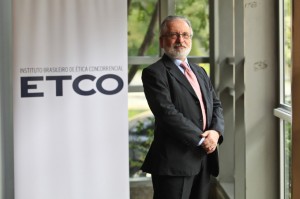Zero tolerance
Robert Abdenur
Executive President of the Brazilian Institute of Competition Ethics - ETCO
Hard task has a society that proposes to change its culture. From the economic stabilization provided by the end of hyperinflation, almost two decades ago, the tolerance that we Brazilians had towards informality in the economy began to show.
The new millennium reinforced the perception of this tolerance by bringing great changes not only in Brazil, but abroad. Globalization has consolidated and the world economy has grown, increasing the exchange of products and the need for formalization on the part of companies that aimed to grow in the domestic and foreign markets.
It was evident to some groups of Brazilian businessmen and specialists that it was time to end the culture of transgressions, the one that is lenient with informality, so ingrained in society at the time. If, during the last decades of the 20th century, the informal route presented itself as an alternative to circumvent rampant inflation, with the arrival of economic stabilization it was clear that this practice led to the multiplication of predatory companies, supported by tax evasion, in addition to serving encouragement of any order of contravention.
It was necessary to change his attitude. It was necessary to change the culture of economic relations, stimulating a healthier and more ethical business environment in the country. In this process of change, the Brazilian Institute for Competitive Ethics (ETCO) was the protagonist in proposing several initiatives to improve the business environment.
From 2003, the country, through its public and private institutions, launched a series of actions to curb practices that were hitherto current. In June 2003, the National Congress established the Piracy CPI. Its main result: to suggest the creation of a public agency for the adoption of public policies to combat piracy. It was the origin of the National Council for Combating Piracy and Intellectual Property Offenses (CNCP).
Created in the following year and responsible for the formulation of a National Plan to Combat Piracy, the CNCP, an organ of the Ministry of Justice, is composed of representatives of the public and private powers, a pioneering initiative with regard to the protection of intellectual property. An important development of this process was the creation of the Free City of Piracy Program, whose management is under the responsibility of ETCO, which has already been implemented in seven municipalities and is the asset of the CNCP to comply with the agreement signed with FIFA to combat piracy in host cities for the 2014 FIFA World Cup Brazil.
CNCP's work gained international prominence. In 2011, he was quoted by the United States Trade Representative (USTR, in the follow in English) when announcing the withdrawal of Brazil from Priority Watch List, a list of countries subject to trade sanctions for not having intellectual property rights considered adequately protected.
In the same year of 2003, another initiative by ETCO would represent a major step in the elimination of subterfuges of a tax nature to obtain competitive advantages in the market and, consequently, unfair competition. It was Constitutional Amendment nº 42/2003, which, in its article 146-A, provides that the differentiated taxation systems adopted by the Union coexist with new special criteria from the States, the Federal District and the municipalities, necessary to ensure that the tax burden uniform for competing companies. The regulation of Art. 146-A was proposed in May this year by Senator Delcídio Amaral, through PLS 0161/2013, and awaits Senate approval.
A great revolution in the fight against tax evasion would come with the institution of the electronic invoice (NF-e). Today, it is unthinkable to do business without this resource. According to the IRS, since its implementation in 2008, there have been more than 5 billion emissions, with more than 800 thousand issuing companies.
In addition to the advances in the fight against tax evasion already mentioned, the large mass of data generated by the digital process of the NF-e allowed the development of the BI NF-e, a tax intelligence tool that, after being approved by the Bahia Finance Secretariat ( Sefaz-BA), was made available free of charge to all interested states.
More recently, the National Meeting of State Tax Coordinators and Administrators (ENCAT) took another important step in improving the system with the Recipient Manifestation project, which requires the validation of the NF-e at both ends of the operation, with a view to avoiding operations fraudulent.
Of all the ills caused by unfair competition, the most serious, undoubtedly, is related to medicines. In 2008, a pilot project for the Drug Tracking System was developed at ETCO, with the objective of collaborating with Anvisa in defining the system necessary to comply with Law No. 11.903 / 09, which created the National Drug Control System. At the end of last May, Anvisa held a public hearing to define the system.
Figures from the last decade confirm that Brazil has changed. The Underground Economy Index, developed by ETCO in conjunction with the Brazilian Institute of Economics of the Getulio Vargas Foundation (IBRE-FGV), has been estimating the size of the parallel economy compared to the formal one since 2003. At that time, the underground economy represented 21% Gross Domestic Product. In 2012, 16,6%.
Until we reach a zero tolerance level with unfair competition and misconduct, there is still a long way to go. But the change in culture only occurs with persistence and time. Citizens and institutions determined to make a difference cannot give up. One day, we'll get there.




